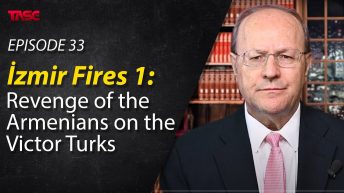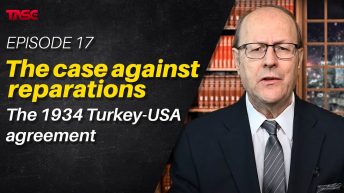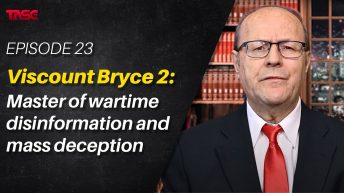Dr. Heath Lowry’s meticulous research in Episode 33 has demonstrated how Armenian writers use only those sources that support their allegations and ignore all others, no matter how much more powerful those ignored sources are. Dr. Lowry was able to document how Hovannisian and Hovsepian kept recycling pretty much the same selective sources to arrive at the same incomplete and erroneous picture with misleading conclusions. And in Episode 34, Mark O. Prentiss, the American representative of the Near Eastern Relief, showed us in his detailed eyewitness report that Armenians and Greeks, not Turks, set the fire in Izmir. Prentiss informed us that it was on Wednesday, September 13th, 1922, that Izmir’s Austrian Fire Chief, Paul Grescovich, found evidence of incendiarism in Armenian schools and Churches, in the form of “petroleum-soaked refuse ready for torch.” Grescovich’s own firemen, as well as Turkish guards had shot down many Armenian young men disguised either as woman or as Turkish irregular soldiers, who were caught setting fires during Tuesday night [Sept. 12th] and Wednesday [Sept 13th] morning.” Luckily for the forces of truth, Prentiss had his detailed account published by North American Newspaper Alliance in the United States in 1923. The two-part banner headline read: “Armenians and Greeks, not Turks, set the fire – Evidence of fire chief revealed. The hitherto untold story of the Smyrna fire told by Mark O. Prentiss, American representative of the Near Eastern Relief.” He wrote: “Nearly everybody in America, it appears, is convinced that the Turks were responsible for the fire which added the final touches of tragedy to the [Izmir] horror. The unanimity and firmness of this conviction surprised me at first, as I believe it would have surprised anybody else, of whatever nationality or political allegiance, who had recently come from the scene of the disaster. The motive, usually considered of supreme importance in crimes of this sort, does not clearly point to the Turks. They had captured Smyrna. The city, as it stood, was one of the greatest prizes ever taken in oriental warfare. The Turks had unquestioned title to its foods, its commodities of all sorts, its houses. It was a store house of supplies most urgently needed for its peoples and armies. Why destroy it? It was a matter of common knowledge, on the other hand, that the Armenians and Greeks were determined not to let this booty fall into the hands of their hated enemies. There was a generally accepted report in Smyrna, for several days before the fire, that an organized group of Armenian young men had sworn to burn the city if it fell to the Turks. Evidence gathered by Grescovich and carefully checked by myself, together with information which came to me from other sources, points to the Armenians as authors of the fire…We arrived on the evening of Friday, the eighth of September, in time to see the last of the Greek army leaving the city. Early in the morning of the ninth, we went ashore and immediately organized a relief committee which consisted of practically all of the American residents there, together with representatives of The Near East Relief and the American Red Cross from (Istanbul). Admiral Bristol had sent his chief of staff, captain Hepburn, as his personal representative to serve as chairman of this committee. A report has been widely circulated in {America] to the effect that the Armenian hospital, where some fifteen hundred refugees had gathered was burned by Turkish soldiers who slaughtered many of the helpless occupants. The truth of the matter is that on Tuesday, early in the afternoon, in response to an emergency appeal, I had gone to the hospital accompanied by Dr. Post and two nurses, all of us members of the Near East Relief staff. While I was there, a squad of from fifteen to twenty Turkish soldiers, under the command of the captain, came to take over the hospital for Turkish military purposes. The refugees were searched, as they came from the grounds, and arms of various sorts sufficient to fill a truck were taken from them. All of them, men, women and children, who had taken refuge both in the hospital building and in the adjoining grounds were dispersed by six o’clock that afternoon. The captain in command had written instructions from the Turkish commander to take possession of the hospital and to prepare it for immediate occupancy. He told us that they would begin moving Turkish patients to the hospital that night. He also mentioned that he had orders to shoot the refugees if they had refused to disarm, and that he certainly would have done so, but for their unexpected docility in giving up their weapons. He credited their willingness to disarm to the presence of the Americans.”
Myths and Realities




Add comment